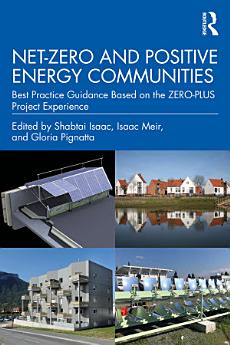Net-Zero and Positive Energy Communities: Best Practice Guidance Based on the ZERO-PLUS Project Experience
About this ebook
Through the ZERO-PLUS project, a consortium of 32 partners from eight countries, including academic institutions, technology providers, architects, and construction companies, designed four communities covering completely different geo-climatic regions, construction practices, and cultural backgrounds in Cyprus, Italy, France, and the UK. The communities were designed, optimized, constructed, monitored, handed over to tenants, post-occupancy evaluated, and troubleshooted through a system of continuous collaboration and data acquisition. This book presents these case studies and shows how the project targets of reducing electricity consumption below 20 kWh/m2/y, increasing electricity production from Renewable Energy Systems to over 50 kWh/m2/y, and at cheaper costs when compared to current zero-energy buildings were reached and surpassed. These cases demonstrate that a holistic and interactive approach to design and construction can bring communities a high standard of sustainability.
The key features of the book include:
- Practical guidance drawn from the interdisciplinary, international, and remote cooperation between experts from academia and industry across the construction sector
- A survey of the state-of-the-art on net-zero and positive-energy communities, including the experience and the lessons learned from previous projects and from the ZERO-PLUS project
- Descriptions of novel emerging renewable energy technologies, integrated into real case study communities to achieve the energy generation target of the communities
- A comprehensive set of approaches, tools, guidelines, best practices, challenges, and lessons learned from the five-year ZERO-PLUS project and the completion of four residential case studies to inform the reader of how to achieve affordable net-zero energy communities
- Four typologies of residential communities located in different climatic conditions are presented, touching on the critical aspects of the design, construction, monitoring, and occupancy phase
- A discussion of future trends for developing communities that are more liveable, accessible, and sustainable and which can comply with new energy policies in a way that is affordable for the owners and residents.
About the author
Shabtai Isaac is a Senior Lecturer in Project Management at Ben Gurion University of the Negev, Israel.
Isaac Meir is Architect, Town Planner, Archaeologist, and Professor at Ben Gurion University of the Negev, Israel.
Gloria Pignatta is Scientia Lecturer and City Futures Research Centre (CFRC) Fellow (2021–2024) in the School of Built Environment (BE), Faculty of Arts, Design, and Architecture (ADA), at University of New South Wales, Australia.





